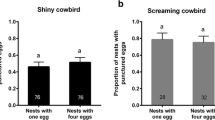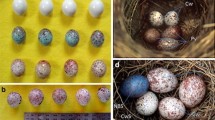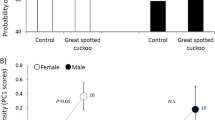Abstract
Interspecific avian brood parasites, like cuckoos and cowbirds, lay their eggs in nests of other species, the hosts, which take over the entire parental care of the parasite's eggs and chicks. This breeding strategy requires decisions that may affect the parasite's reproductive success. During the breeding season, cowbirds search for host nests and revisit them to monitor its progress and parasitize at the time host laying begins. When visiting hosts nests, they repeatedly peck the nest contents trying to destroy one or more eggs. This behaviour favours parasite's offspring by reducing the competition for food with nestmates. We evaluated if the egg-pecking behaviour of female shiny (Molothrus bonariensis) and screaming (M. rufoaxillaris) cowbirds is affected by the strength and the size of the eggs they find in the nest. We presented to wild-caught females artificial clutches with two natural eggs that differ in size and shell strength. We found that female shiny and screaming cowbirds adjusted egg-pecking behaviour based on the strength but not on the size of the eggs. When differences in strength between eggs were high, both cowbird species pecked more frequently the egg with the weaker shell, increasing the probability of a successful puncture. Our results indicate that female cowbirds can discriminate eggs through the strength of the shell, and by choosing the weaker egg to peck, they increase the probability of puncturing.



Similar content being viewed by others
Availability of data and materials
The datasets generated and analysed during the current study are included as supplementary material.
Code availability
Not applicable.
References
Arcese P, Smith JN, James NM, Hatch MI (1996) Nest predation by cowbirds and its consequences for passerine demography. Proc Natl Acad Sci USA 93:4608–4611. https://doi.org/10.1073/pnas.93.10.4608
Astié AA, Reboreda JC (2006) Costs of egg punctures and parasitism by shiny cowbirds, (Molothrus bonariensis), at creamy-bellied thrush (Turdus amaurochalinus) nests. Auk 123:23–32. https://doi.org/10.1093/auk/123.1.23
Avilova KV (2018) Spatial organization of the epithelial structures in the bill tip organ of waterfowl (Anseriformes, Aves). Biol Bull Rev 8:234–244. https://doi.org/10.1134/s2079086418030027
Bailey IE, Morgan KV, Bertin M, Meddle SL, Healy SD (2014) Physical cognition: birds learn the structural efficacy of nest material. Proc R Soc B 281:20133225. https://doi.org/10.1098/rspb.2013.3225
Berkhoudt H (1976) The epidermal structure of the bill tip organ in chicks. Neth J Zool 26:561–566. https://doi.org/10.1163/002829676X00226
Berkhoudt H (1980) The morphology and distribution of cutaneous mechanoreceptors (Herbst and Grandry corpuscles) in bill and tongue of the mallard (Anas platyrhynchos L.). Neth J Zool 30:1–34. https://doi.org/10.1163/002829680X00014
Breen A, Guillette LM, Healy SD (2016) What can nest-building birds teach us? CCBR 11:83–102. https://doi.org/10.3819/ccbr.2016.110005
Carter MD (1986) The parasitic behavior of the bronzed cowbird Molothrus aeneus in south Texas USA. Condor 88:11–25. https://doi.org/10.2307/1367748
Cossa NA, Tuero DT, Reboreda JC, Fiorini VD (2017) Egg pecking and puncturing behaviors in shiny and screaming cowbirds: effects of eggshell strength and degree of clutch completion. Behav Ecol Sociobiol 71:60. https://doi.org/10.1007/s00265-017-2289-1
Davies NB (2000) Cuckoos, cowbirds and other cheats. T. & A.D, Poyser. London
De Mársico MC, Reboreda JC (2014) Adaptaciones y contraadaptaciones entre el Tordo Pico Corto (Molothrus rufoaxillaris) y el Tordo Músico (Agelaioides badius). Hornero 29:1–12
De Mársico MC, Mahler B, Reboreda JC (2010) Reproductive success and nestling growth of the baywing parasitized by screaming and shiny cowbirds. Wilson J Ornithol 122:417–431. https://doi.org/10.1676/09-140.1
De Mársico MC, Gloag R, Ursino CA, Reboreda JC (2013) A novel method of rejection of brood parasitic eggs reduces parasitism intensity in a cowbird host. Biol Lett 9:20130076. https://doi.org/10.1098/rsbl.2013.0076
Dubbeldam JL, Karten HJ (1978) The trigeminal system in the pigeon (Columba livia) I. Projections of the gasserian ganglion. J Comp Neurol 180:661–678. https://doi.org/10.1002/cne.901800402
Dubina KM, Peer BD (2013) Egg pecking and discrimination by female and male brown-headed cowbirds. J Ornithol 154:553–557. https://doi.org/10.1007/s10336-012-0916-1
Fiorini VD, Tuero DT, Reboreda JC (2009) Shiny cowbirds synchronize parasitism with host laying and puncture host eggs according to host characteristics. Anim Behav 77:561–568. https://doi.org/10.1016/j.anbehav.2008.11.025
Fiorini VD, Gloag R, Kacelnik A, Reboreda JC (2014) Strategic egg destruction by brood-parasitic cowbirds? Anim Behav 93:229–235. https://doi.org/10.1016/j.anbehav.2014.04.038
Fiorini VD, De Mársico MC, Ursino CA, Reboreda JC (2019) Obligate brood parasitism on Neotropical birds. In: Reboreda JC, Fiorini VD, Tuero DT (eds) Behavioral Ecology of Neotropical Birds. Springer, Switzerland. 103–131. https://doi.org/10.1007/978-3-030-14280-3_6
Fraga R (1983) The eggs of the parasitic Screaming Cowbird Molothrus rufoaxillaris and its host the Baywing Molothrus badius: is there evidence for mimicry? J Ornithol 124:187–194. https://doi.org/10.1007/BF01640164
Gentle MJ, Breward J (1986) The bill tip organ of the chicken (Gallus gallus var. domesticus). J Anat 145:79–85
Gloag R, Fiorini VD, Reboreda JC, Kacelnik A (2012a) Brood parasite eggs enhance egg survivorship in a multiply parasitized host. Proc R Soc B 279:1831–1839. https://doi.org/10.1098/rspb.2011.2047
Gloag R, Tuero DT, Fiorini VD, Reboreda JC, Kacelnik A (2012b) The economics of nestmate killing in avian brood parasites: a provisions trade-off. Behav Ecol 23:132–140. https://doi.org/10.1093/beheco/arr166
Gloag R, Fiorini VD, Reboreda JC, Kacelnik A (2013) The wages of violence: mobbing by mockingbirds as a frontline defence against brood parasitic cowbirds. Anim Behav 86:1023–1029. https://doi.org/10.1016/j.anbehav.2013.09.007
Gloag R, Fiorini VD, Reboreda JC, Kacelnik A (2014) Shiny cowbirds share nests, but not mothers, in multiply parasitized mockingbird broods. Behav Ecol Sociobiol 68:681–689. https://doi.org/10.1007/s00265-014-1682-2
Gottschaldt KM, Lausmann S (1974) The peripheral morphological basis of tactile sensibility in the beak of geese. Cell Tissue Res 153:477–496. https://doi.org/10.1007/BF00231542
Guigueno MF, Sealy SG (2011) Aggression towards egg-removing cowbird elicits clutch abandonment in parasitized yellow warblers, Dendroica petechia. Anim Behav 81:211–218. https://doi.org/10.1016/j.anbehav.2010.10.005
Guigueno MF, Snow DA, MacDougall-Shackleton SA, Sherry DF (2014) Female cowbirds have more accurate spatial memory than males. Biol Lett 10:20140026. https://doi.org/10.1098/rsbl.2014.0026
Gutiérrez-Ibañez C, Iwaniuk AN, Wylie DR (2009) The independent evolution of the enlargement of the principal sensory nucleus of the trigeminal nerve in three different groups of birds. Brain Behav Evol 74:289–294. https://doi.org/10.1159/000270904
Healy SD, Jones CM (2002) Animal learning and memory: an integration of cognition and ecology. Zoology 105:321–327. https://doi.org/10.1078/0944-2006-00071
Honza M, Taborsky B, Taborsky M, Teuschl Y, Vogl W, Moksnes A, Røskaft E (2002) Behaviour of female common cuckoos, Cuculus canorus, in the vicinity of host nests before and during egg laying: a radiotelemetry study. Anim Behav 64:861–868. https://doi.org/10.1006/anbe.2002.1969
Hoover JP, Robinson SK (2007) Retaliatory mafia behavior by a parasitic cowbird favors host acceptance of parasitic eggs. Proc Natl Acad Sci USA 104:4479–4483. https://doi.org/10.1073/pnas.0609710104
Krulis V (1978) Struktur und Verteilung von Tastrezeptoren im Schnabel-Zungenbereich von Singvögeln im besonderen der Fringillidae. Rev Suisse Zool 85:385–447. https://doi.org/10.5962/bhl.part.82241
Lefebvre L, Nicolakakis N, Boire D (2002) Tools and Brains in Birds. Behav 139:939–973. https://doi.org/10.1163/156853902320387918
Llambías PE, Ferretti V, Reboreda JC (2006) Egg discrimination and sex-specific pecking behaviour in parasitic cowbirds. Ethology 112:11281135. https://doi.org/10.1007/s10336-012-0916-1
López AV, Fiorini VD, Ellison K, Peer BD (2018) Thick eggshells of brood parasitic cowbirds protect their eggs and damage host eggs during laying. Behav Ecol 29:965–973. https://doi.org/10.1093/beheco/ary045
López AV, Reboreda JC, Fiorini VD, Gerschenson LN, Hauber ME (2021) A comparative study of the structural and mechanical properties of avian eggshells amongst hosts of obligate brood parasitic cowbirds (genus Molothrus). Biol J Linn Soc. https://doi.org/10.1093/biolinnean/blab041
López A (2013) Comparative analysis of the eggshell characteristics of the parasitic species (genus Molothrus) and their main hosts. Undergraduate thesis, University of Buenos Aires, Buenos Aires
Lopez A (2021) A study of the mechanical and structural properties of the eggs of obligate brood parasitic cowbirds (Icteridae: Molothrus) and some of their hosts. PhD dissertation thesis, University of Buenos Aires, Buenos Aires
Lowther PE (2018) Lists of victims and hosts of the parasitic cowbirds (Molothrus). Field Museum of Natural History, Chicago, Illinois. Version 5 Sep 2018. Available at https://www.fieldmuseum.org/sites/default/files/cowbird-hosts-05sep2018.pdf
Mason P (1986a) Brood parasitism in a host generalist, the shiny cowbird: I. The quality of different species as hosts. Auk 103:52–60. https://doi.org/10.1093/auk/103.1.52
Mason P (1986b) Brood parasitism in a host generalist, the shiny cowbird: II. Host Selection Auk 103:61–69. https://doi.org/10.1093/auk/103.1.61
Massoni V, Reboreda JC (1998) Costs of brood parasitism and the lack of defences on the yellow-winged blackbird-shiny cowbird system. Behav Ecol Sociobiol 42:273–280. https://doi.org/10.1007/s002650050439
Mermoz ME, Reboreda JC (1999) Egg-laying behaviour by shiny cowbirds parasitizing brown-and-yellow marshbirds. Anim Behav 58:873–882. https://doi.org/10.1006/anbe.1999.1228
Ortega C (1998) Cowbirds and other brood parasites. The University of Arizona Press, Tucson
Peer BD (2006) Egg destruction and egg removal by avian brood parasites: adaptiveness and consequences. Auk 123:16–22. https://doi.org/10.1093/auk/123.1.16
Peer BD, Sealy SG (1999) Parasitism and egg puncture behavior by Bronzed and Brown-Headed Cowbirds in sympatry. Stud Avian Biol 18:235–240
Picman J (1989) Mechanism of increased puncture resistance of eggs of brown-headed cowbirds. Auk 106:577–583. https://doi.org/10.1093/auk/106.4.577
Picman J, Pribil S (1997) Is greater eggshell density an alternative mechanism by which parasitic cuckoos increase the strength of their eggs? J Ornithol 138:531–541. https://doi.org/10.1007/BF01651384
R Development Core Team (2013) R: a language and environment for statistical computing. R Foundation for Statistical Computing, Vienna, Austria. http://www.R-project.org. R Foundation for Statistical Computing, Vienna, Austria
Reboreda JC, Clayton NS, Kacelnik A (1996) Species and sex differences in hippocampus size in parasitic and non-parasitic cowbirds. NeuroReport 7:505–508. https://doi.org/10.1097/00001756-199601310-00031
Reboreda JC, Fiorini VD, De Mársico MC, Gloag R, Scardamaglia RC (2017) Parasitic Behaviour of Interspecific Brood Parasitic Females. In: Soler M. (ed) Avian Brood Parasitism. Fascinating Life Sciences. Springer, Cham. https://doi.org/10.1007/978-3-319-73138-4_18
Scardamaglia RC, Fiorini VD, Kacelnik A, Reboreda JC (2017) Planning host exploitation through prospecting visits by parasitic cowbirds. Behav Ecol Sociobiol 71:23. https://doi.org/10.1007/s00265-016-2250-8
Sealy SG (1992) Removal of yellow warbler eggs in association with cowbird parasitism. Condor 94:40–54. https://doi.org/10.2307/1368794
Sherry DF, Guigueno MF (2019) Cognition and the brain of brood parasitic cowbirds. Integ Zool 14:145–157. https://doi.org/10.1111/1749-4877.12312
Sherry DF, Krebs JR, Cowie RJ (1981) Memory for the location of stored food in Marsh Tits. Anim Behav 29:1260–1266. https://doi.org/10.1016/S0003-3472(81)80078-4
Sherry D, Forbes M, Khurgel M, Ivy G (1993) Females have a larger hippocampus than males in the brood-parasitic Brown-headed Cowbird. Proc Natl Acad Sci USA 90:7839–7843. https://doi.org/10.1098/rsbl.2014.0026
Shettleworth SJ (2001) Animal cognition and animal behaviour. Anim Behav 61:277–286. https://doi.org/10.1006/anbe.2000.1606
Skaug H, Fournier D, Nielsen A, Magnusson A, Bolker B (2014) glmmADMB: generalized linear mixed models using AD Model Builder. R package version 0.8.0.
Soler M, Pérez-Contreras T (2012) Location of suitable nests by great spotted cuckoos: an empirical and experimental study. Behav Ecol Sociobiol 66:1305–1310. https://doi.org/10.1007/s00265-012-1385-5
Spaw CD, Rohwer S (1987) A comparative study of eggshell thickness in cowbirds and other passerines. Condor 89:307–318. https://doi.org/10.2307/1368483
Spottiswoode CN (2013) A brood parasite selects for its own egg traits. Biol Lett 9:20130573. https://doi.org/10.1098/rsbl.2013.0573
Spottiswoode CN, Colebrook-Robjent JF (2007) Egg puncturing by the brood parasitic Greater Honeyguide and potential host counteradaptations. Behav Ecol 18:792–799. https://doi.org/10.1093/beheco/arm025
Tuero DT, Fiorini VD, Reboreda JC (2007) Effects of shiny cowbird Molothrus bonariensis parasitism on different components of house wren Troglodytes aedon reproductive success. Ibis 149:521–529. https://doi.org/10.1111/j.1474-919X.2007.00676.x
Tuero DT, Fiorini VD, Reboreda JC (2012a) Do shiny cowbird females adjust egg pecking behavior according to the competition their chicks face in host nests? Behav Processes 89:137–142. https://doi.org/10.1016/j.beproc.2011.10.012
Tuero DT, Fiorini VD, Mahler B, Reboreda JC (2012b) Shiny Cowbird egg size and chick growth vary between two hosts that differ markedly in body size. J Avian Biol 43:227–233. https://doi.org/10.1111/j.1600-048X.2012.05596.x
Ursino CA, Facchinetti C, Reboreda JC (2012) Preformative molt in brood parasitic screaming (Molothrus rufoaxillaris) and shiny (M. bonariensis) cowbirds. Ornitol Neotrop 23:159–168
Ursino CA, Strong MJ, Reboreda JC, Riehl C (2020) Genetic patterns of repeat and multiple parasitism by screaming cowbirds, a specialist brood parasite. Anim Behav 167:177–183. https://doi.org/10.1016/j.anbehav.2020.07.012
White DJ (2020) Avian egg timers: Female Cowbirds judge past, present, and future when making nest parasitism decisions. Front Ecol Evol 8:203. https://doi.org/10.3389/fevo.2020.00203
White DJ, Ho L, Freed-Brown G (2009) Counting chicks before they hatch: female cowbirds can time readiness of a host nest for parasitism. Psychol Sci 20:1140–1145. https://doi.org/10.1111/j.1467-9280.2009.02418.x
Wilcoxon F (1945) Individual comparisons by ranking methods. Biom Bull 1:80–83. https://doi.org/10.2307/3001968
Wiley JW (1988) Host selection by the shiny cowbird. Condor 90:289–303. https://doi.org/10.2307/1368557
Zuur AF, Ieno EN, Walker NJ, Saveliev AA, Smith GM (2009) Mixed effects models and extensions in ecology with R. Springer, New York
Acknowledgements
We thank the Elsa Shaw de Pearson Foundation for supporting our fieldwork at Reserva El Destino. We also thank two anonymous reviewers and the Associate Editor Kazuhiro Goto who provided their helpful comments on a previous version of the manuscript. This work was supported by Grants of the Agencia Nacional de Promoción Científica y Tecnológica and the University of Buenos Aires.
Funding
This work was supported by grants of the Agencia Nacional de Promoción Científica y Tecnológica and the University of Buenos Aires.
Author information
Authors and Affiliations
Corresponding author
Ethics declarations
Conflict of interest
This manuscript is not being considered elsewhere and all coauthors have agreed to this submission. We have no conflicts of interest to disclose.
Ethical approval
Experiment protocol has been established in compliance with the ethical standards, ensuring that all necessary precautions have been taken and the welfare of the birds has been respected. All work complied with the Argentinean Law for the Conservation of Wild Fauna (Ley Nacional de Fauna 22421/81) and was conducted with the authorization from the Organismo Provincial para el Desarrollo Sostenible, Argentina (Permit Number 202/12-O.P.D.S.).
Consent to participate
All coauthors gave their approval for the submission.
Consent for publication
All coauthors gave their approval for publication.
Additional information
Publisher's Note
Springer Nature remains neutral with regard to jurisdictional claims in published maps and institutional affiliations.
Supplementary Information
Below is the link to the electronic supplementary material.
Rights and permissions
About this article
Cite this article
Cossa, N.A., Reboreda, J.C. & Fiorini, V.D. Decision-making at the time of parasitism: cowbirds prefer to peck eggs with weaker shells. Anim Cogn 25, 275–285 (2022). https://doi.org/10.1007/s10071-021-01549-6
Received:
Revised:
Accepted:
Published:
Issue Date:
DOI: https://doi.org/10.1007/s10071-021-01549-6




